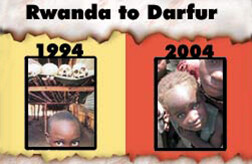"Are all humans human, or are some more human than others?" asks Roméo
Dallaire. The question grew out of his horrific experience as the commander
of the UN Assistance Mission to Rwanda in 1994. Dallaire repeatedly sounded the
alarm about the impending massacre of the Tutsis, but the UN and the members of
the Security Council did nothing, for a mixture of reasons ranging from fear of
commitment, to overwhelming bureaucratic hurdles, to public apathy—the major
powers had no vital interests in Africa after all.
According to Samantha Power, although the UN community knew about the systematic killings, nobody used the word "genocide" until too late, in case it turned out to be exaggerated. In addition, Americans wrongly thought that using the "G" word would commit them to military intervention under the Geneva Conventions. In fact they could have imposed a variety of sanctions, such as threatening prosecution, freezing foreign assets, and rallying troops from other countries. Instead, the world stood by as 800,000 people were slaughtered in 100 days.
Later Kofi Annan, President Clinton, and others apologized for their failure. "Never again," said the world community. Yet when Dallaire visited the Council in 2003 and again in 2005, he asked the same question: "Are some more human than others?" And he was not just looking backward to Rwanda. He was addressing the massacres in the Congo and the killings in Darfur, where government-backed Arab militias are systematically destroying communities of African descent. Over the last two years, up to 300,000 people are estimated to have died in Darfur from violence and disease, and more than 1.8 million have been displaced. By January 2005, many observers felt it was déjà vu all over again, as Yogi Berra would say. Yet the UN Cassese Commission investigating Darfur concluded that although the Janjaweed militias may be engaging in "crimes against humanity," their actions do not constitute genocide.
Director of Human Rights Watch Kenneth Roth gives the Bush administration credit for calling the world's attention to Darfur and pushing for an end to the killings. The problem, said Roth in a recent Council talk, is that sanctions are impossible because of China's veto threat; hence the UN response has been limited to the deployment of peacekeepers and the threat of prosecution. But since the major powers' militaries are stretched right now, peacekeeping has been delegated to the African Union (AU), which has few resources. It is having difficulties deploying even the 3,300 troops authorized so far—pitifully few to police the vast Darfur region. A UN force is desperately needed to supplement the AU.
There is another problem, too, when it comes to prosecuting the perpetrators. As Roth put it, the United States has "an ideological aversion" to the International Criminal Court. He believes, however that the United States could abstain from or even support an ICC referral for Darfur without compromising its fundamental objection to the Court. "When I was in Khartoum in October 2004, I was very struck by how fearful senior government leaders are of the ICC," Roth added. "They are very worried about their personal future and their liberty and see The Hague as a genuine threat." Senators Corzine and Brownback have no doubt that genocide is occurring in Darfur. On March 2, 2005 they introduced the Darfur Accountability Act, which calls for immediate steps, including:
- a new UN Security Council resolution with sanctions;
- an extension of the current arms embargo to cover the government of Sudan;
- a military non-fly zone in Darfur; and
- accelerated assistance to the AU mission.
Darfur's dead cannot be brought back to life, but perhaps finally there is hope for others being threatened. Or will Dallaire, haunted by the ghosts of Rwanda, return to the Carnegie Council two years from now and demand to know yet again: "Are all humans human, or are some more human than others?"




